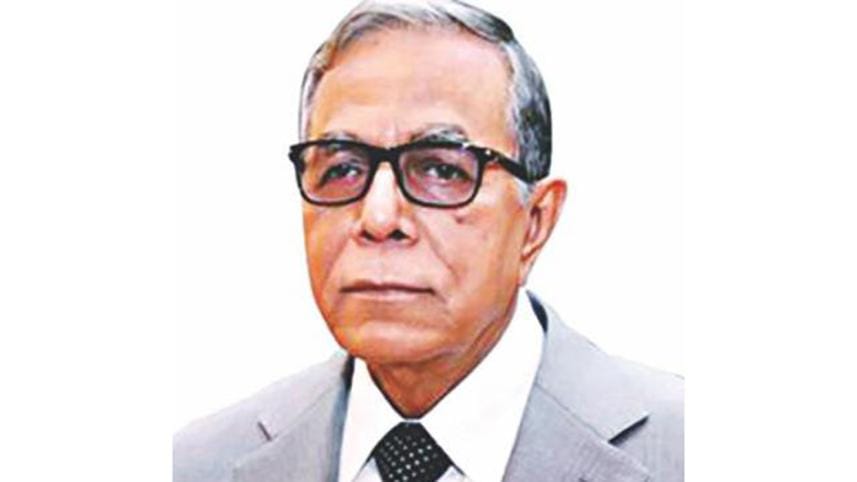President approves Digital Security Act
Cabinet did not discuss the bill as promised by 3 ministers; concern of journalists, rights bodies about some sections of the law ignored

President Abdul Hamid yesterday signed the Digital Security Bill into law amid widespread criticism that it curbs freedom of speech and expression and media freedom guaranteed by the constitution.
President's Press Secretary Joynal Abedin confirmed this to The Daily Star yesterday afternoon.
Termed draconian at home and abroad, the bill was passed in parliament on September 19, ignoring concerns of journalists and rights defenders and keeping a harsh provision that allows police officials to search or arrest anyone without a warrant.
The bill was sent to the president on Thursday with a number of local and international bodies requesting him to send it back to the House. TIB, ARTICLE 19, RTI Forum, Amnesty International, Ain o Salish Kendra and Human Rights Forum were among the organisations.
READ MORE: Editors denounce Digital Security Bill
Article 80 of the constitution offered the president two options. He could give assent to the bill or return it to parliament with a message that the proposed law or any particular provisions be reconsidered. He also could suggest considering any amendments specified by him in the message.
But he must choose either of the options within 15 days after the bill is presented to him. If he fails to do so within the timeframe, he shall be deemed to have signed the bill at the expiration of that period.
According to sources, the president signed the bill around noon yesterday when the weekly cabinet meeting was taking place at the Prime Minister's Office.
Nothing about the law was raised at the meeting though three ministers earlier had assured journalist leaders of placing their concerns before it.
Responding to a query, Cabinet Secretary Mohammad Shafiul Alam in his briefing at the secretariat said the cabinet meeting didn't discuss the Digital Security Act.
A copy of the signed bill was sent to the Bangladesh Government Press from the Parliament Secretariat for publishing of the gazette notification.
After the cabinet meeting, chaired by Prime Minister Sheikh Hasina, a senior minister wishing anonymity told this newspaper that the PM expressed her views at her October 3 press conference and so there was no need for any discussion regarding the law.
At that press conference, Hasina said journalists who don't publish false news need not worry about the Digital Security Act. “If anybody doesn't have any criminal mindset or any plan to commit an offence, he or she has nothing to worry about.”
Journalists and rights activists observe that the new act goes against the main spirit of the constitution.
On several occasions, the Sampadak Parishad (Editors' Council), and media practitioners expressed serious concern over section 8, 21, 25, 28, 29, 31, 32, and 43 of the bill, saying the provisions restrict free-thinking, freedom of speech and freedom of expression.
But the law was enacted keeping the provisions intact.
After the passage of the bill, three ministers assured the Sampadak Parishad and journalist leaders of holding a meeting to draw up acceptable changes to the act.
The platform of editors called for a human chain on September 29 in front of the Jatiya Press Club.
The programme was later postponed in response to a request from Information Minister Hasanul Haq Inu and his offer for talks. Dhaka Reporters' Unity also postponed its human chain slated for September 27.
Later on September 30, Sampadak Parishad had a meeting with Inu; Posts, Telecommunications and Information Technology Minister Mustafa Jabbar; Law Minister Anisul Huq and Prime Minister's Media Adviser Iqbal Sobhan Chowdhury.
After the meeting, the law minister pledged to sit with editors and journalist leaders in this regard and place the concerns at the cabinet meeting to work out amendments.
“The next cabinet meeting, scheduled for October 3, may not discuss the issue as it already has many other agendas. But the concerns of the Editors' Council will be placed before the cabinet meeting after this one,” Anisul Huq said.
Yesterday's cabinet meeting was the first one after October 3 but that saw no discussion regarding the act.
BSS adds: Awami League General Secretary and Road Transport and Bridges Minister Obaidul Quader yesterday said the Digital Security Act was enacted mainly to punish evil persons and save the innocents.
“Good people need not panic upon enactment of the Digital Security Act as it will protect them and bring the evil persons to justice,” he told a discussion of AL's industries and commerce affairs sub-committee at Krishibid Institution at Farmgate.
Turning down the BNP's allegation that the Digital Security Act was aimed at prolonging the AL rule, Quader said the law is for checking digital crimes and spread of rumours that fuel violence.



 For all latest news, follow The Daily Star's Google News channel.
For all latest news, follow The Daily Star's Google News channel.
Comments